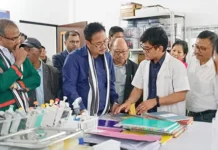[ Dr SBC Singh ]
Every year the 10th April is observed as World Homoeo-pathy Day to mark the importance of homoeopathy and its contribution to the world of medicine.
This day is observed all over the world to remember the life and legacy of Dr. Samuel Christian Friedrich Hahnemann the Father of Homoeopathy. The World Homoeopathy Day was first observed in 2005. This year is the 268th Anniversary of our Dr. Samuel Christian Friedrich Hahnemann. Today people continue to believe the curative power of Homoeopathic therapy in many places like India where homoeopathy is widely practiced. There are more than 2.8 lakhs registered Homoeopathy practitioners in India. It is true that many people prefer Homoeopathy over other system of medicines day by day for many condition especially chronic diseases and other ailments which are hard to cure by other system of medicine. Today homoeopathy remains most widely accepted type of Therapeutic system. It is highly developed health practice that uses a systematic approach to the totality of person’s health. Any person seeking a fuller understanding of holistic health and healing will find Homoeopathy treatment extremely useful.
The histories of many men who have risen to eminence in some particular branch of science teach us that they have done so under the most unfavorable circumstances, and in spite of the greatest obstacles. Samuel Hahnemann belonged to this class of great men.
Dr. Samuel Christian Friedrich Hahnemann M.D.
(1755-1843)
Samuel Hahnemann, in full Christian Friedrich Samuel Hahnemann was born on April 10 1755, Meissen, Saxony [now in Germany] and died on July 2, 1843, Paris, France, is a German physician, founder of the system of therapeutics known as Homoeopathy.
As a young man, Hahnemann became proficient in a number of languages, including English, French, Italian, Greek and Latin. He eventually made a living as a translator and teacher of languages, gaining further proficiency in “Arabic, Syriac, Chaldaic and Hebrew.”
Samuel Hahnemann established the fundamental principles of the science and art of Homoeopathy.
He is called the Father of Experimental Pharmacology because he was the first physician to prepare medicines in a specialized way; proving them on healthy human beings, to determine how the medicines acted to cure diseases. Before Hahnemann, medicines were given on speculative indications, mainly on the basis of authority without experimental verification.
Dr. Hahnemann espoused the law of cure known as “Similia Similibus Curentur,” or “Like Cures Like.” This means that a remedy that produces symptoms in a healthy person will cure those same symptoms when manifested by a person in a diseased state. This law of cure has been verified by millions of homoeopaths all over the world since the time of Hahnemann.
Dr. Hahnemann described the different aspects of ‘acute’ and ‘chronic’ diseases. Acute diseases are transitory; they have a beginning and an end, whereas the chronic diseases are co-existent with life. Either they are present in a manifest or a latent state. From this work came the chronic miasms of Psora, Syphilis, and Sycosis.
Dr. Hahnemann treated thousands of difficult and chronic cases that defied the best care from allopaths all over Europe. Thus, he became so famous that physicians from Europe and America came to him for coaching in the new science and art of healing, called Homoeopathy.
Discovery of Homeopathy
In 18th century, there were many theories and hypothesis regarding nature of disease and cause of disease, due to many theories and hypothesis there are numerous method of treatment without fixed principles.
While translating William Cullen’s ‘A Treatise on the Materia Medica,’ Hahnemann encountered the claim that cinchona, the bark of a Peruvian tree, was effective in treating malaria because of its astringency. Hahnemann believed that other astringent substances are not effective against malaria and began to research cinchona’s effect on the human body by self-application. Noting that the drug induced malaria-like symptoms in himself, he concluded that it would do so in any healthy individual. This led him to postulate a healing principle: “that which can produce a set of symptoms in a healthy individual, can treat a sick individual who is manifesting a similar set of symptoms.” This principle, like cures like, became the basis for an approach to medicine which he gave the name Homeopathy.
In the year 1796, “An Essay on new principle for ascertaining the Curative Powers of Drugs and some examination of the previous Principles” was published in Hufeland’s Journal Vol 2. Dr Hahnemann also put forward his new doctrine of Similia Similibus and Curantur. So birth of Homeopathy took place in the year 1796.
In 1810 the first edition of “Organon of medicine” was published. Organon of medicine is the foundation on which the philosophy and principles for practice of homoeopathy remains through this Hahnemann conveys that the physicians high and only mission is to restore the sick to health, what he termed as to cure.
2023 World Homeopathy Day theme
The 2023 World Homeopathy Day theme is Homoeoparivar – Sarvajan Swasthya is “One Health, One Family,” which focuses on the use of homoeopathy to treat various mental health conditions, including anxiety, depression etc. The theme emphasizes the significance of taking a holistic approach to mental health, which involves addressing both the symptoms and the root causes of mental illness.
Importance of World Homeopathy Day
World Homeopathy Day provides an opportunity to celebrate the birth anniversary of Dr. Samuel Hahnemann, who is widely regarded as the founder of homeopathy. Dr. Hahnemann’s ground-breaking work in developing the principles of homeopathy has had a profound impact on the practice of medicine and the way in which we approach healthcare.
World Homeopathy Day is significant for raising awareness about the benefits of homeopathy as a safe and effective complementary medicine.
Homeopathy has been used for over 200 years to treat a wide range of health conditions and is gaining popularity globally as a natural and holistic alternative to conventional medicine.
The day highlights ongoing efforts by homeopaths and organizations to promote the practice of homeopathy and advocate for its integration into mainstream healthcare.
World Homeopathy Day provides an opportunity for homeopaths and patients to share experiences and demonstrate the effectiveness of homeopathy in treating various health conditions. (The contributor of article is SMO, SG (H), Roing, Lower Dibang Valley district)


